
Chancellor Rishi Sunak is delivering his Spring Statement to MPs.
The Budget comes on a day when the Bank of England announced an interest rate cut to 0.25% to help mitigate the economic impact of the coronavirus.
Here’s the latest:
1.20pm
PA video of Mr Sunak summarising the Government’s response to coronavirus.
1.19pm
Mr Sunak said 30,000 hectares of trees will be planted over the next five years and 35,000 hectares of peatland will be restored.
1.17pm
Mr Sunak said he will make £120 million available immediately to repair all defences damaged in the winter floods.
He added he will provide £200 million directly to local communities to build flood resilience and will double investment in flood defences over the next six years to £5.2 billion.
1.14pm
Mr Sunak said he would freeze the levy on electricity from April 2022 and raise the levy on gas to help tackle the climate crisis.
He said he will introduce a “plastics packaging tax” charging manufacturers and importers £200 per tonne on packaging made of less than 30% of recycled plastic.
1.13pm
Mr Sunak said research and development investment will be increased to £22 billion a year.
£1.4 billion will be invested in the science institute at Weybridge, which is analysing samples of cornavirus, and more than £900 million in nuclear fusion, space and electric vehicles.
1.11pm
Mr Sunak said research and development investment would be increased to £22 billion a year.
1.10pm
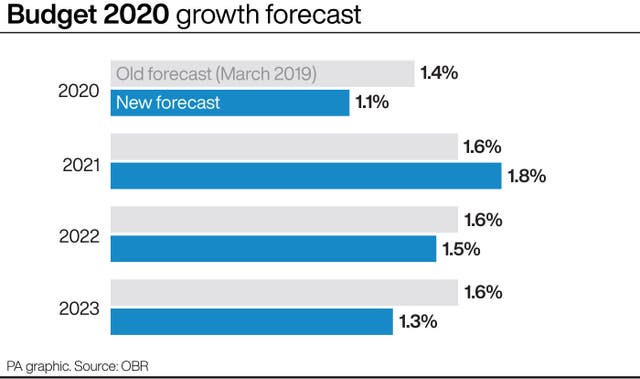
1.09pm
Beer duty will also be frozen, the Chancellor said, as he confirmed that the tampon tax would be abolished.
1.08pm

Mr Sunak announced that fuel duty will remain frozen for another year.
The planned increase in spirits duty will be cancelled and duties for cider and wine drinkers will be frozen as well.
1.08pm
The National Insurance threshold will increase from £8,632 to £9,500.
1.07pm
Increasing the National Insurance threshold from £8632 to £9,500 – giving 31 million people a tax cut, saving a typical employee £104. #Budget2020 pic.twitter.com/jHEH3ZPEfg
— HM Treasury (@hmtreasury) March 11, 2020
1.06pm
The Chancellor said ministers would publish a new remit for the independent Low Pay Commission to have a formal target of the National Living Wage reaching two-thirds of median earnings by 2024 “as long as economic conditions allow” – a rate of more than £10.50 an hour.
1.04pm
Mr Sunak met Bank of England governor Mark Carney this morning ahead of the Commons statement.
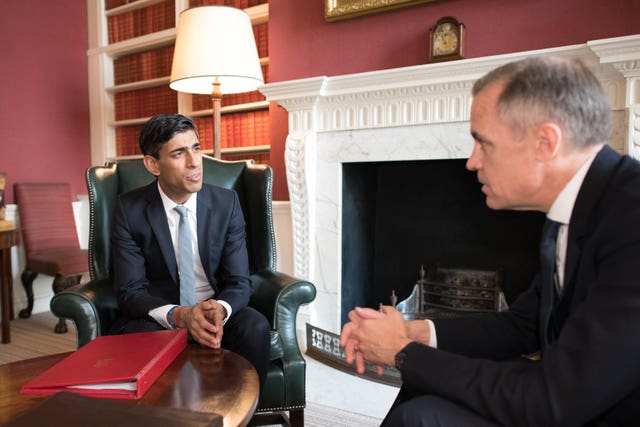
1.03pm
Rishi Sunak calls the Conservatives “the real workers party” #Budget2020
— Lewis McKenzie (@LewisMcKenzie94) March 11, 2020
1.01pm
Mr Sunak said the OBR forecasts that headline debt will be lower at the end of this parliament than it is currently, falling from 79.5% this year to 75.2% in 2024/25.
1.00pm
The Chancellor said the OBR reports that borrowing will then fall to 2.5%, 2.4% and 2.2% in the following years.
12.59pm
The Chancellor said the OBR reports a current budget surplus in every one of the next five years, with borrowing increasing from 2.1% of GDP in 2019/20 to 2.4% in 2020/21 and 2.8% in 2021/22.
12.58pm
A summary of the @OBR_UK forecast and other economic data. The fundamentals of the UK economy are strong. #Budget2020 pic.twitter.com/Qnraj86efn
— HM Treasury (@hmtreasury) March 11, 2020
12.57pm
The Chancellor said that without accounting for the impact of coronavirus, the Office for Budget Responsibility has forecast growth of 1.1% in 2020, 1.8% in 2021 and then 1.5%, 1.3%, and 1.4% in the following years.
12.55pm
Mr Sunak said the Office for Budget Responsibility has “slightly reduced” its forecast for GDP growth compared with its March 2019 forecast.
12.54pm
1/ The government is taking action that is coordinated, coherent and comprehensive on COVID-19.
This thread outlines some of the support in #Budget2020. pic.twitter.com/j7lCFhWaPx
— Rishi Sunak (@RishiSunak) March 11, 2020
12.53pm
Two million workers on low pay and those who are self-employed are not eligible for statutory sick pay under this government. No one should have to choose between heath and hardship. We are calling for all workers to be given the right to sick pay from day one. #Budget2020
— The Labour Party (@UKLabour) March 11, 2020
12.52pm
Mr Sunak said he was setting aside a £5 billion emergency response fund to support the NHS and other public services, adding he “will go further if necessary”.
12.51pm
I love #BudgetDay But #Budget2020 is extra special – genuinely historic and a moment to celebrate – first #BAME Chancellor presenting a #UK budget 👏🏽💕 pic.twitter.com/zazlNBunlY
— Sayeeda Warsi (@SayeedaWarsi) March 11, 2020
12.49pm
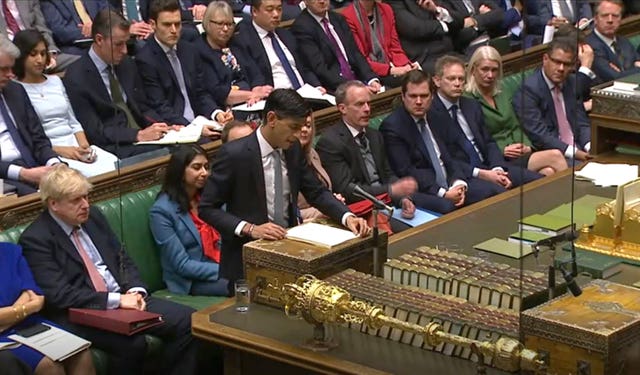
12.46pm
The Chancellor said the Government will meet the cost for businesses with fewer than 250 employees, to provide statutory sick pay to those off work “due to coronavirus”.
12.45pm
Mr Sunak said: “Those on contributory employment and support allowance will be able to claim from day one instead of day eight to make sure that time spent off work due to sickness is reflected in your benefits. I’m also temporarily removing the minimum income floor in Universal Credit.”
12.43pm
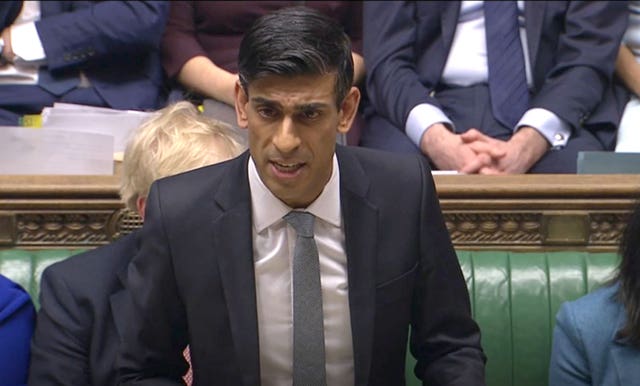
12.42pm
Mr Sunak said that “whatever extra resources our NHS needs” to cope with the coronavirus “it will get”.
12.41pm
The Chancellor said the Government’s response to the coronavirus will be “temporary, timely and targeted” and designed to have “maximum impact”.
12.39pm
Mr Sunak said there is likely to be “temporary disruption” to the economy while up to a fifth of the working age population could be off at any one time.
12.36pm
Mr Sunak said “we are doing everything we can to keep this country and our people healthy and financially secure” as he delivered his Budget against the backdrop of the coronavirus crisis.
12.34pm
The Chancellor of the Exchequer rose to deliver his Budget to the House of Commons at 12.34pm.
12.15pm
PA video of Mr Sunak leaving Downing Street.
11.58am
Labour figures have called on the Chancellor to offer support for residents forced to pay for cladding removal from their flats.
Almost three years after Grenfell, no resident should face big bills to remove and replace dangerous cladding on their home.
A big test of this Budget is action to get this work done and end the #claddingscandal https://t.co/3DUo9p00Wy
— John Healey MP (@JohnHealey_MP) March 11, 2020
My letter to @RishiSunak yesterday. For his first budget he must finally provide the security and safety residents need, by providing the necessary funding required to make tower blocks affected by cladding and other fire safety deficiencies safe pic.twitter.com/RmfLrbV5pq
— Rebecca Long-Bailey (@RLong_Bailey) March 11, 2020
11.53am
Mr Sunak with departmental colleagues on Downing Street.
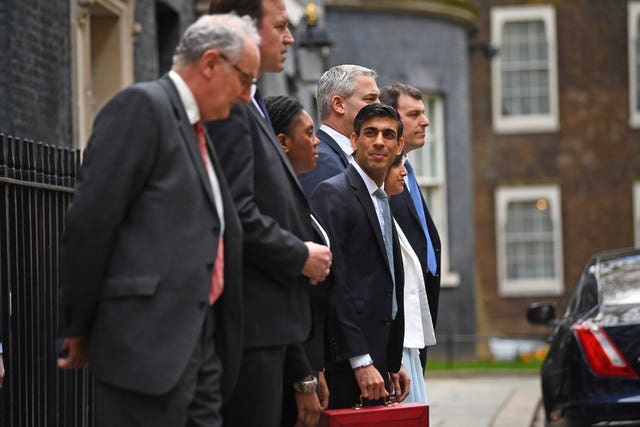
11.37am
Mr Sunak has left 11 Downing Street to head to the House of Commons.
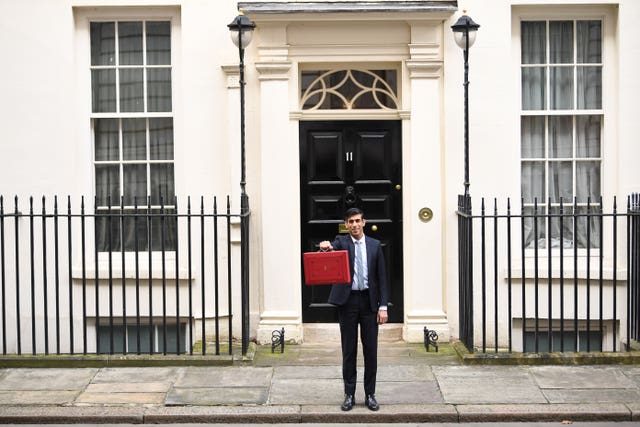
11.09am
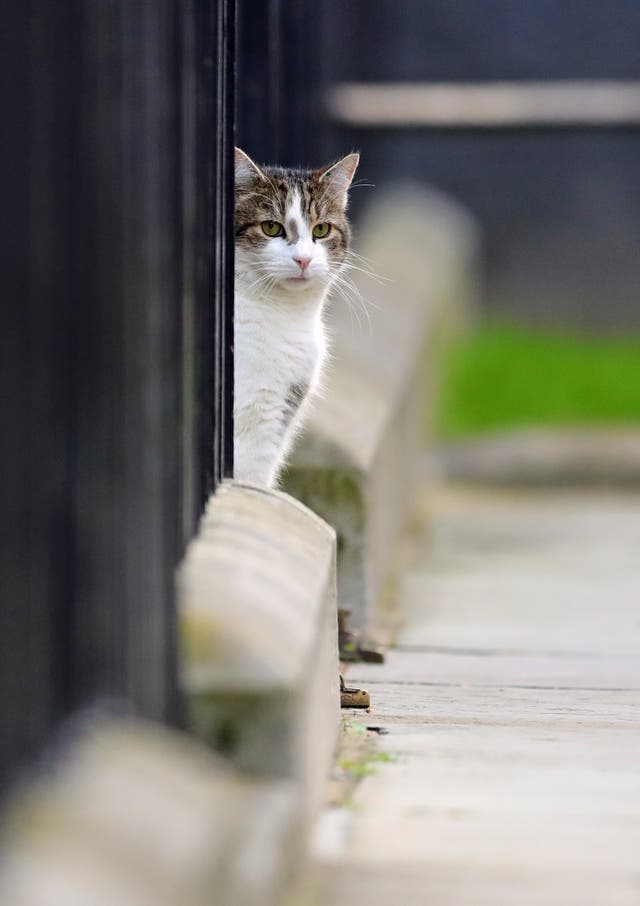
10.29am
Mr Sunak told the Cabinet his Budget’s measures to cope with Covid-19 “will make the UK one of the best placed economies in the world to manage the potential impact of the virus”, Downing Street said.
10.17am
The economy stayed flat in January despite predictions that it would grow by 0.2% following a tough year, figures showed.
The Office for National Statistics said GDP remained unchanged after growing 0.3% in December, dashing hopes that the economy was bouncing back after a clear win for the Conservatives in December’s election.
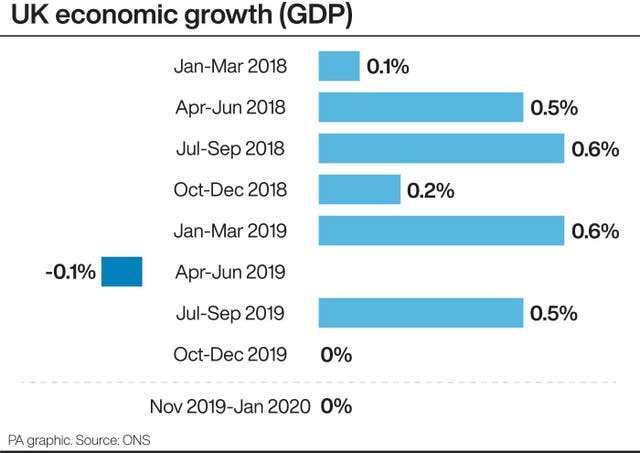
8.02am
The Bank of England announced an emergency interest rate cut to help the UK cope with the economic shock from coronavirus as Rishi Sunak prepared to unveil his first Budget.
Hours before he was due to unveil his package, the Bank set the scene with the rate cut from 0.75% to 0.25% and a series of other measures to help businesses and households through an economic shock “that could prove sharp and large, but should be temporary”.


Comments: Our rules
We want our comments to be a lively and valuable part of our community - a place where readers can debate and engage with the most important local issues. The ability to comment on our stories is a privilege, not a right, however, and that privilege may be withdrawn if it is abused or misused.
Please report any comments that break our rules.
Read the rules hereLast Updated:
Report this comment Cancel